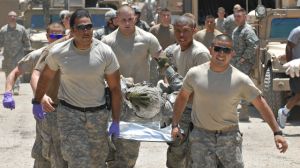
Soldiers at a forward operating base Apache in eastern Baghdad carry injured soldiers to the medical center after an IED destroyed a Bradley fighting vehicle killing five US soldiers and an Iraqi interpreter on June 21, 2007. (AP Photo/Army Times, Rick Kozak)
In 2012, HSBC entered into a deferred prosecution agreement with US regulators for violating “federal laws by laundering money from Mexican drug trafficking and processing banned transactions on behalf of Iran, Libya, Sudan and Burma,” USA Today reported. The bank ended up paying $1.9 billion to make the charges go away: It was just one of “several deals US authorities… reached with other banks over similar allegations” in recent years. The settlement represented less than ten percent of the bank’s pre-tax profits that year, according to its annual report.
But on Monday, a new wrinkle was added when HSBC Group was one of five major banks named in a lawsuit filed in a New York court by wounded US vets — and families of soldiers killed in Iraq — under the novel theory that the financial institutions indirectly helped fund attacks on US troops by Shi’ite militia groups loyal to Iran.
Alison Frankel reports for Reuters:
The lawsuit filed in US District Court in Brooklyn, New York, named Barclays Plc, Credit Suisse Group AG, HSBC Holdings Plc, Standard Chartered and Royal Bank of Scotland Group Plc.
The banks did not immediately respond to requests for comment.
The lawsuit was brought under the U.S. Anti-Terrorism Act, a 1992 law that permits victims to bring private suits against alleged financiers of militant operations.
Brought on behalf of more than 200 veterans and family members, the lawsuit alleges the banks conspired with Iranian banks to mask wire transactions in order to evade U.S. sanctions. The Iranian banks then funneled more than $100 million to militant groups that operated in Iraq at Iran’s direction, according to the suit.
The militant groups included a Shi’ite militia in Iraq, Kataib Hezbollah, as well as Quds Force, the overseas arm of Iran’s Islamic Revolutionary Guard Corps, the suit says…
The agreements did not allege a link between the transactions, which the U.S. government viewed as unlawful, and militant operations…
Patrick Farr, a California-based plaintiff whose son Clay was killed by a roadside bomb in February 2006, said the lawsuit has given him “a sense that I was able to do something, hold someone accountable for his death.”
The suit is the first case under the Anti-Terrorism Act in which former U.S. soldiers seek damages against international banks. It is also one of the first to be crafted as a conspiracy case.
For more detail, read the whole story at Reuters.


